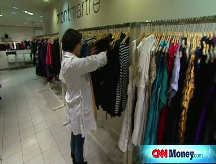Secondhand stores shine in weak retail market
As thrifty customers turn to secondhand goods, resale stores are profiting from the recession.

NEW YORK (CNNMoney.com) -- On a Wednesday afternoon in late December, the average wait to sell clothing at Buffalo Exchange, a Manhattan consignment shop, was about 25 minutes. Beyond the front counter, where the consignors sought pocket cash and tax deductions, nearly a dozen shoppers squeezed themselves between overstuffed racks in the 450-square-foot space, seeking bargains amid used designer jeans and last season's cashmere sweaters.
"You should see this place on weekends," said the store's assistant manager. "The lines get to be at least 10 people deep."
The month-old shop, which already possesses the slight musty smell typical to thrift stores, is the first Manhattan location for Buffalo, a Tucson-based secondhand-clothes retail chain with 34 stores across the nation. The new store's crowds are indicative of both Buffalo Exchange's continuing success - the privately held company says it has $50 million in annual revenue and is concluding its third consecutive year of sales growth - and also of the resale market's overall performance. Secondhand shops are a bright spot in today's downtrodden retail industry.
"We do real well in economic downturns," said Kerstin Block, 66, who founded Buffalo 34 years ago with her husband. "I think that people are more willing to sell their clothes when the economy's bad, and they're more likely to shop in used-goods stores. It's less expensive."
In what's supposed to be the busiest time of year for department stores and retailers, the National Retail Federation reports that clothing stores' sales are down more than 7% over the previous year. ShopperTrak, a research firm that charts foot traffic at the nation's malls, says that holiday crowds are down by about 10% since last year and that overall sales this season will only increase by about 0.1%.
"People can't afford to buy as much these days at the regular retail channels," said Jeff Van Sinderen, a senior retail analyst at B. Riley, a Los Angeles research and investment firm. "Consumers are looking for extreme values."
As a result, sales are flourishing at secondhand shops as a new echelon of shoppers finds its way into resale stores. Of the store owners who responded to a recent survey from the National Association of Resale and Thrift Shops (NARTs), 74% said that September and October sales increased over the prior year, by an average of 35%. Goodwill Industries, a nonprofit that operates 2,200 thrift stories, says that same-store revenue have increased by an average of 7% compared to last year. The Salvation Army, with 1,370 nonprofit secondhand shops nationwide, also reports significant gains.
"We're up about 20 to 25% over last year," says Major George Hood, the national community relations secretary for the Salvation Army. "Yet despite the strong sales trend, folks aren't donating as much stuff - rather than donate to charity, they're selling elsewhere, turning their things into cash in their pockets."
Customers selling to Buffalo Exchange, which caters to twentysomethings in hip, urban neighborhoods, get the most cash for American Apparel (APP) t-shirts, cashmere cardigans, and neo-preppy button downs. Escada tops and St. Johns jackets are selling well this season at secondhand shop Act II in Newport News, Va. Closer to Hollywood, Twice the Style, based in Orange County, Calif., recently sold a Bottega Veneta purse for $1,600 - about $900 less than what it went for when it was new in the fall.
"Folks are looking at their closets as a source of revenue," said Liz Pierce, a senior analyst with Roth Capital Partners, an investment bank in Newport Beach, Calif. "So you're probably seeing better product at these places."
While an increase in used designer goods has helped resale stores draw more middle-class shoppers, so have rising concerns about the environment - the stigma once placed on used clothing is fading.
"I'd say our biggest driver of business these days has been the urge for folks to be green," says Buffalo's Block. The items that Buffalo won't buy from sellers - tattered clothing or pieces that have gone out of style - get donated to local charities. Buffalo recently started donating used fur items to animal shelters, where they're used as bedding.
Also helping the secondhand stores: Consumers are developing an aversion to luxury goods. "Shoppers today aren't so much into conspicuous consumption," says Adele Meyer, executive director of NARTs. "They have a need to fill, and they're looking at our industry to do it."
Roth Capital's Pierce, whose hairdresser recently advised her to check out a secondhand shop for holiday dresses ("that would have never happened a year ago," she says), notes that people "are buying high-low all the time. At malls you always see folks with Neiman Marcus bags and Forever 21 bags."
In the meantime, consignment shop owners may be the only retailers who won't mind a long recession. Kerstin Block, who founded her company during a weak economy in 1974, will celebrate her 35th year in business next year by opening three new Buffalo stores, one in Baltimore, Boston, and Seattle.
Other shop owners are a bit more cautious. "We're just hoping that when the economy gets better, people will stick with us," says Shannon Barisoff, owner of Twice the Style. "It's sort of a circle of life." ![]()
-
The Cheesecake Factory created smaller portions to survive the downturn. Play
-
A breeder of award-winning marijuana seeds is following the money and heading to the U.S. More
-
Most small businesses die within five years, but Amish businesses have a survival rate north of 90%. More
-
The 10 most popular franchise brands over the past decade -- and their failure rates. More
-
These firms are the last left in America making iconic products now in their twilight. More












